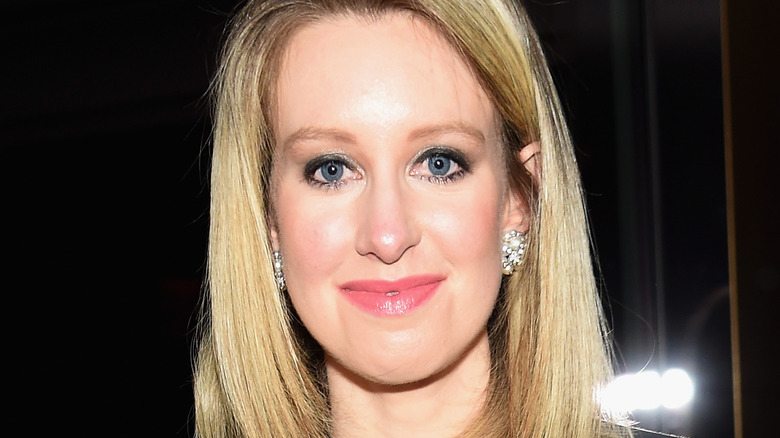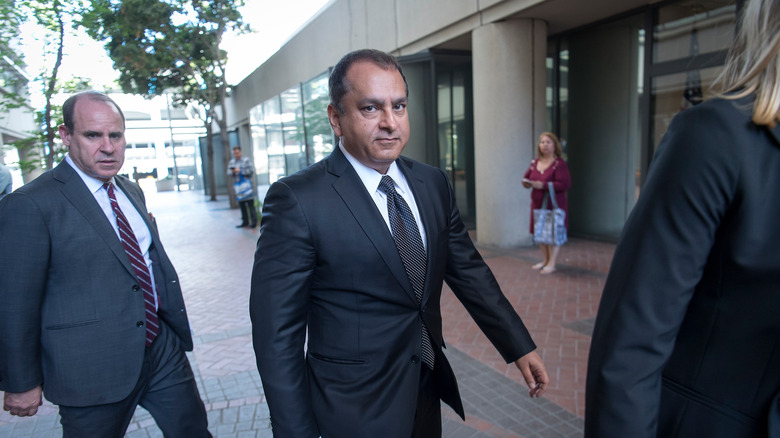The Charges Against Elizabeth Holmes Explained
In 2003, the blond, ambitious Stanford dropout Elizabeth Holmes took the health care technology industry by storm. After attending Stanford for less than two years, she left at 19 to launch her revolutionary blood testing company, Theranos. The company, which derived its name from a combination of the words "therapy" and "diagnosis," set out to create a revolutionary new blood analysis machine that could test for a whole host of medical conditions, using just a single finger prick's worth of blood. Holmes soon became a media darling, landing magazine covers and drawing comparisons to Steve Jobs. She attracted a wide range of wealthy investors, including high-profile backers like Rupert Murdoch, and her brand-new company was soon flush with cash. By the end of 2010, she had raised a remarkable $92 million and secured a star-studded cast for her board of directors (via Inc).
While Holmes had made big promises to the media, to her investors, and to her supporters, behind the scenes, things at Theranos looked much different. The revolutionary nature of Holmes' blood testing technology rested on its ability to test for a wide range of medical conditions using only a few drops of blood, rather than a whole sample drawn from a vein. Holmes also claimed her machine would be quicker, more convenient, more accurate, and much cheaper than traditional lab testing. However, there was one big problem: the revolutionary blood analyzer that she claimed would disrupt the whole health technology industry did not really exist.
Holmes 'revolutionary' technology did not really exist
By 2014, when Holmes was just 30 years old, Theranos was valued at over $9 billion, according to the BBC. However, by that time, Holmes' blood testing empire was already starting to unravel. Former employees and whistleblowers had begun to come out of the woodwork, and soon, it became apparent that the blood analyzer machine that Holmes had long touted was a fraud. A federal investigation was launched, and an audit was conducted by the Centers for Medicare & Medicaid Services, and the company she had built and run for a decade began to crumble. Theranos was barred from participating in the blood-testing business for two years, and Holmes was forced to pay out $4.65 million to 175,000 consumers in Arizona who brought a consumer fraud lawsuit against Theranos, as well as another $30,000 penalty to settle with the Centers for Medicare and Medicaid Services, per USA Today.
Holmes was eventually forced to dissolve her company. In March 2018, the U.S. Securities and Exchange Commission charged Holmes with "massive fraud," claiming that she had raised over $700 million by "deceiving investors by making it appear as if Theranos had successfully developed a commercially-ready portable blood analyzer," via USA Today. She was forced to pay another $500,000 penalty and was "barred from serving as an officer or director of a public company" for a minimum of 10 years.
Charged with wire fraud and conspiracy to commit wire fraud
However, that was not the end of Elizabeth Holmes' legal battles. Because Holmes had knowingly made false claims and omitted crucial facts about the true capability of Theranos' technology, a federal grand jury also charged her with "two counts of conspiracy to commit wire fraud and nine counts of wire fraud," according to the U.S. Department of Justice. The charges were brought against Holmes, as well as Theranos chief operating officer and president, Ramesh "Sunny" Balwani, in June 2018.
The federal indictment charged that Holmes and Balwani had intentionally defrauded potentially investors, to the tune of millions of dollars, by falsely claiming, via media, advertisements, financial statements, and other communications, to have developed a new, revolutionary blood analyzer. However, the federal government alleged they knew that the analyzer "had accuracy and reliability problems, performed a limited number of tests, was slower than some competing devices, and, in some respects, could not compete with existing, more conventional machines," via the U.S. Department of Justice. The indictment also alleged that both defendants repeatedly lied about Theranos' financial conditions, telling potential investors that the company was on track to generate $100 million in revenues in 2014, and a whopping $1 billion in revenues in 2015, despite reportedly knowing the claims were exaggerated. After multiple delays, in part due to the coronavirus pandemic and Holmes' pregnancy, she was finally brought to trial on September 8, 2021.
Holmes was found guilty on four counts
On January 4, 2022, Holmes was found guilty on four of the charges: "one count of conspiracy to commit wire fraud and three counts of wire fraud," according to CNBC. Holmes was also found not guilty on three charges of wire fraud related to defrauding the public and one count of conspiracy, per NBC. The jury reached these verdicts after seven days of deliberations, although they remained deadlocked on the remaining three investor wire fraud charges. Because the jury was unable to reach a verdict, the judge declared a mistrial on these three charges.
Holmes could now face a maximum of up to 20 years in prison on each count, to be served consecutively. However, most legal experts believe it is extremely unlikely Holmes will actually be behind bars that long. She "is looking at a potential prison sentence of 10 years, assuming she doesn't accept any responsibility, and she just appeals, which I expect her to do. She's not someone who is going to want to do even five months in prison, much less five years," Neama Rahmani, a former federal prosecutor and West Coast Trial Lawyers co-founder, explained to the Observer.



